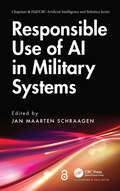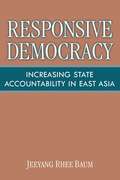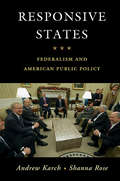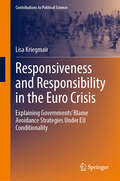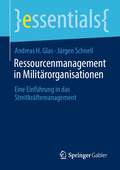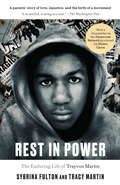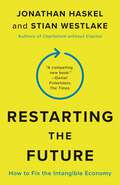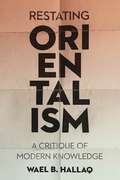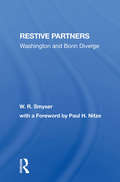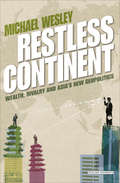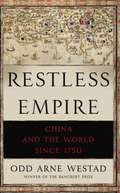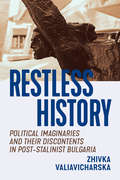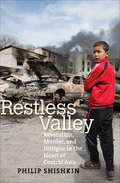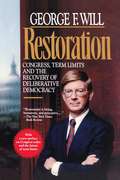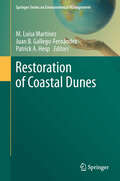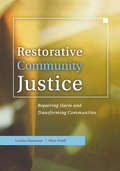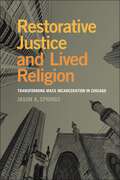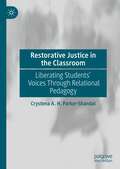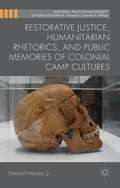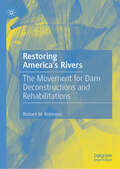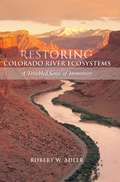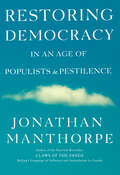- Table View
- List View
Responsible Use of AI in Military Systems (Chapman & Hall/CRC Artificial Intelligence and Robotics Series)
by Jan Maarten SchraagenArtificial Intelligence (AI) is widely used in society today. The (mis)use of biased data sets in machine learning applications is well‑known, resulting in discrimination and exclusion of citizens. Another example is the use of non‑transparent algorithms that can’t explain themselves to users, resulting in the AI not being trusted and therefore not being used when it might be beneficial to use it.Responsible Use of AI in Military Systems lays out what is required to develop and use AI in military systems in a responsible manner. Current developments in the emerging field of Responsible AI as applied to military systems in general (not merely weapons systems) are discussed. The book takes a broad and transdisciplinary scope by including contributions from the fields of philosophy, law, human factors, AI, systems engineering, and policy development.Divided into five sections, Section I covers various practical models and approaches to implementing military AI responsibly; Section II focuses on liability and accountability of individuals and states; Section III deals with human control in human‑AI military teams; Section IV addresses policy aspects such as multilateral security negotiations; and Section V focuses on ‘autonomy’ and ‘meaningful human control’ in weapons systems.Key Features: Takes a broad transdisciplinary approach to responsible AI Examines military systems in the broad sense of the word Focuses on the practical development and use of responsible AI Presents a coherent set of chapters, as all authors spent two days discussing each other’s work This book provides the reader with a broad overview of all relevant aspects involved with the responsible development, deployment and use of AI in military systems. It stresses both the advantages of AI as well as the potential downsides of including AI in military systems.
Responsive Authoritarianism in China
by Christopher HeurlinHow can protests influence policymaking in a repressive dictatorship? Responsive Authoritarianism in China sheds light on this important question through case studies of land takings and demolitions - two of the most explosive issues in contemporary China. In the early 2000s, landless farmers and evictees unleashed waves of disruptive protests. Surprisingly, the Chinese government responded by adopting wide-ranging policy changes that addressed many of the protesters' grievances. Heurlin traces policy changes from local protests in the provinces to the halls of the National People's Congress (NPC) in Beijing. In doing so, he highlights the interplay between local protests, state institutions, and elite politics. He shows that the much-maligned petitioning system actually plays an important role in elevating protesters' concerns to the policymaking agenda. Delving deep into the policymaking process, the book illustrates how the State Council and NPC have become battlegrounds for conflicts between ministries and local governments over state policies.
Responsive Democracy: Increasing State Accountability in East Asia
by Jeeyang Rhee BaumUnder what conditions is a newly democratic government likely to increase transparency, accountability, and responsiveness to its citizens? What incentives might there be for bureaucrats, including those appointed by a previously authoritarian government, to carry out the wishes of an emerging democratic regime? Responsive Democracy addresses an important problem in democratic transition and consolidation: the ability of the chief executive to control the state bureaucracy. Using three well-chosen case studies---the Philippines, South Korea, and Taiwan---Jeeyang Rhee Baum explores the causes and consequences of codifying rules and procedures in a newly democratic government. In the Philippines, a president facing opposition has the option of appointing and dismissing officials at will and, therefore, has no need for administrative procedure acts. However, in South Korea and Taiwan, presidents employ such legislation to rein in recalcitrant government agencies, and, as a consequence, increase transparency, accountability, and responsiveness. Moreover, as Baum demonstrates by drawing upon surveys conducted both before and after implementation, administrative procedural reforms in South Korea and Taiwan improved public confidence in and attitudes toward democratic institutions.
Responsive Environments
by Graham Smith Sue McGlynn Alan Alcock Paul MurrainClearly demonstrates the specific characteristics that make for comprehensible, friendly and controllable places; 'Responsive Environments' - as opposed to the alienating environments often imposed today. By means of sketches and diagrams, it shows how they may be designed in to places or buildings. This is a practical book about architecture and urban design. It is most concerned with the areas of design which most frequently go wrong and impresses the idea that ideals alone are not enough. Ideals must be linked through appropriate design ideas to the fabric of the built environemnt itself. This book is a practical attempt to show how this can be done.
Responsive States: Federalism and American Public Policy
by Andrew Karch Shanna RoseThe US Constitution did not establish a clear division of responsibilities between the national government and state governments, so the distribution of policymaking authority is subject to constant renegotiation and debate. When national lawmakers introduce policy initiatives that implicate the states in important ways, why do state leaders sometimes respond with strong support and other times with indifference or outright hostility? Moving beyond the conventional story that state officials simply want money and autonomy from their national counterparts, this book explains how the states' responses over the short, medium, and long term are shaped by policy design, timing, and the interaction between the two. Reaching across different historical eras with in-depth case studies of policies such as Superfund, the No Child Left Behind Act, and the Patient Protection and Affordable Care Act, the book shows how federalism has influenced, and continues to influence, the evolution of American public policy.
Responsiveness and Responsibility in the Euro Crisis: Explaining Governments' Blame Avoidance Strategies Under EU Conditionality (Contributions to Political Science)
by Lisa KriegmairConditionality has become a popular instrument for achieving policy change in the European Union (EU). EU conditionality in the Euro crisis epitomises the responsiveness-responsibility dilemma that comes with increasing supranational influence on national policymaking: governments find it increasingly difficult to responsively address the needs of their citizens and simultaneously fulfil their obligations vis-à-vis supranational institutions. Blame avoidance strategies are a way to mitigate this problem, as they help governments shape public perceptions about who is to be held accountable for unpopular policies. During the Euro crisis, despite it being an easy target, governments facing EU conditionality did not indiscriminately shift blame to the EU. Instead, they drew on a variety of blame avoidance strategies. This book aims to shed light on this observed variation in governments’ strategy choices during the Euro crisis. To do so, it investigates the constraints that EU conditionality imposes on governments’ use of blame avoidance strategies and how governments chose specific strategies from the remaining blame avoidance toolkit.
Ressourcenmanagement in Militärorganisationen: Eine Einführung in das Streitkräftemanagement (essentials)
by Jürgen Schnell Andreas H. GlasDie aktuelle sicherheitspolitische Lage mit neuen Krisen und zwischenstaatlichen Kriegen führt zu hohen Investitionen in die Streitkräfte (u.a. 100 Mrd. Euro Sondervermögen für die Bundeswehr). Damit rückt ein eigentlich altes Thema erneut in den Fokus: Das „Ressourcenmanagement in Militärorganisationen“ ist ein vielschichtiges Thema an der Schnittstelle politisch-ethischer, militärisch-operationeller und ökonomisch-rationaler Disziplinen. Zudem sind von je her situative Bedingungen, zeitliche Dynamik sowie ein hohes Maß an Unsicherheit und Risiko besonders bedeutsam. Dieses essential beschreibt die Grundlagen des Streitkräftemanagement als Ressourcenmanagement in Militärorganisationen. Es bietet damit allen an der Militärökonomik Interessierten einen raschen Zugang zur Problematik und Lösung von Engpässen in Streitkräften.
Rest in Power: The Enduring Life of Trayvon Martin
by Sybrina Fulton Tracy MartinTrayvon Martin’s parents take readers beyond the news cycle with an account only they could give: the intimate story of a tragically foreshortened life and the rise of a movement. <p><p>On a February evening in 2012, in a small town in central Florida, seventeen-year-old Trayvon Martin was walking home with candy and a can of juice in hand and talking on the phone with a friend when a fatal encounter with a gun-wielding neighborhood watchman ended his young life. The watchman was briefly detained by the police and released. Trayvon’s father—a truck driver named Tracy—tried to get answers from the police but was shut down and ignored. Trayvon’s mother, a civil servant for the city of Miami, was paralyzed by the news of her son’s death and lost in mourning, unable to leave her room for days. But in a matter of weeks, their son’s name would be spoken by President Obama, honored by professional athletes, and passionately discussed all over traditional and social media. And at the head of a growing nationwide campaign for justice were Trayvon’s parents, who—driven by their intense love for their lost son—discovered their voices, gathered allies, and launched a movement that would change the country. <p>Five years after his tragic death, Travyon Martin’s name is still evoked every day. He has become a symbol of social justice activism, as has his hauntingly familiar image: the photo of a child still in the process of becoming a young man, wearing a hoodie and gazing silently at the camera. But who was Trayvon Martin, before he became, in death, an icon? And how did one black child’s death on a dark, rainy street in a small Florida town become the match that lit a civil rights crusade? <p>Rest in Power, told through the compelling alternating narratives of Sybrina Fulton and Tracy Martin, answers, for the first time, those questions from the most intimate of sources. It’s the story of the beautiful and complex child they lost, the cruel unresponsiveness of the police and the hostility of the legal system, and the inspiring journey they took from grief and pain to power, and from tragedy and senselessness to meaning. <p>Praise for Rest in Power: <p>"Not since Emmitt Till has a parent’s love for a murdered child moved the nation to search its soul about racial injustice and inequality. Sybrina Fulton and Tracy Martin’s extraordinary witness, indomitable spirit and unwavering demand for change have altered the dynamics of racial justice discourse in this country. This powerful book illuminates the witness, the grief, and the commitment to reform that Trayvon Martin’s death has mobilized; it is a story fueled by a demand for justice but rooted in love.”—Bryan Stevenson, author of Just Mercy <p>“As the fifth anniversary of this tragic crime nears, Fulton and Martin share a remarkably candid and deeply affecting in-the-moment chronicle of the explosive aftermath of the murder. Writing in alternate chapters, they share every detail of their shock, grief, and grueling quest for justice. . . . Given the unconscionable shooting deaths of young black men, many by police, that followed Trayvon’s, this galvanizing testimony from parents who channeled their sorrow into action offers a deeply humanizing perspective on the crisis propelling a national movement.”—Booklist (starred review)<p> “A reminder—not only of Trayvon’s life and death but of the vulnerability of black lives in a country that still needs to be reminded they matter.”—USA Today<p> “A brave, heart-rending narrative from the parents who lost their son far too soon.”—Kirkus Reviews <p> “Remarkably candid and deeply affecting.”—Booklist (starred review)<p>
Restarting the Future: How to Fix the Intangible Economy
by Jonathan Haskel Stian WestlakeFrom the acclaimed authors of Capitalism without Capital, radical ideas for restoring prosperity in today’s intangible economyThe past two decades have witnessed sluggish economic growth, mounting inequality, dysfunctional competition, and a host of other ills that have left people wondering what has happened to the future they were promised. Restarting the Future reveals how these problems arise from a failure to develop the institutions demanded by an economy now reliant on intangible capital such as ideas, relationships, brands, and knowledge.In this groundbreaking and provocative book, Jonathan Haskel and Stian Westlake argue that the great economic disappointment of the century is the result of an incomplete transition from an economy based on physical capital, and show how the vital institutions that underpin our economy remain geared to an outmoded way of doing business. The growth of intangible investment has slowed significantly in recent years, making the world poorer, less fair, and more vulnerable to existential threats. Haskel and Westlake present exciting new ideas to help us catch up with the intangible revolution, offering a road map for how to finance businesses, improve our cities, fund more science and research, reform monetary policy, and reshape intellectual property rules for the better.Drawing on Haskel and Westlake’s experience at the forefront of finance and economic policymaking, Restarting the Future sets out a host of radical but practical solutions that can lead us into the future.
Restating Orientalism: A Critique of Modern Knowledge
by Wael HallaqSince Edward Said’s foundational work, Orientalism has been singled out for critique as the quintessential example of Western intellectuals’ collaboration with oppression. Controversies over the imbrications of knowledge and power and the complicity of Orientalism in the larger project of colonialism have been waged among generations of scholars. But has Orientalism come to stand in for all of the sins of European modernity, at the cost of neglecting the complicity of the rest of the academic disciplines?In this landmark theoretical investigation, Wael B. Hallaq reevaluates and deepens the critique of Orientalism in order to deploy it for rethinking the foundations of the modern project. Refusing to isolate or scapegoat Orientalism, Restating Orientalism extends the critique to other fields, from law, philosophy, and scientific inquiry to core ideas of academic thought such as sovereignty and the self. Hallaq traces their involvement in colonialism, mass annihilation, and systematic destruction of the natural world, interrogating and historicizing the set of causes that permitted modernity to wed knowledge to power. Restating Orientalism offers a bold rethinking of the theory of the author, the concept of sovereignty, and the place of the secular Western self in the modern project, reopening the problem of power and knowledge to an ethical critique and ultimately theorizing an exit from modernity’s predicaments. A remarkably ambitious attempt to overturn the foundations of a wide range of academic disciplines while also drawing on the best they have to offer, Restating Orientalism exposes the depth of academia’s lethal complicity in modern forms of capitalism, colonialism, and hegemonic power.
Restive Partners: Washington And Bonn Diverge
by W. R. Smyser William R SmyserWest Germany is now one of the world's most powerful and prosperous states. The author emphasizes that Germany has become a new Germany, with different capabilities and needs than the Germany of Adenauer's days.
Restless Continent: Wealth, Rivalry and Asia's New Geopolitics
by Michael WesleyAn essential road map to modern Asia&’s dynamic transition on the world stage from the foreign policy expert and author of There Goes the Neighbourhood. The world has never seen economic development as rapid or significant as Asia&’s during recent decades. Home to three-fifths of the global population, this restless continent will soon produce more than half of the world&’s economic output and consume more energy than the rest of the world combined. All but three of the planet&’s current and nascent nuclear powers are Asian, and it has the greatest growth in weapons spending of any other region. Yet, surprisingly little has been written about the future of Asia. Restless Continent is the first book to examine the economic, social, political, and strategic trends across the world&’s largest continent, providing the necessary framework for thinking about the future of Asia—and the world. A professor of international affairs at Australian National University, Michael Wesley looks at the psychology of Asian countries becoming newly rich and powerful. He explores the geography and politics of conflict, and offers persuasive ideas about how to avert dispute, or even war. Written for general readers and policy specialists alike, Restless Continent is an agenda-shaping book about international affairs in the twenty-first century.
Restless Empire: China and the World Since 1750
by Odd Arne WestadOver the past 250 years of momentous change and dramatic upheaval, China has proved itself to be a Restless Empire. Tracing Chinaâe(tm)s course from the eighteenth-century Qing Dynasty to today's Peopleâe(tm)s Republic, Restless Empire shows how the countryâe(tm)s worldview has evolved. It explains how Chinese attitudes have been determined by both receptiveness and resistance to outside influence and presents the preoccupations that have set its foreign-relations agenda. Within two decades China is likely to depose the United States as the worldâe(tm)s largest economy. By then the country expects to have eradicated poverty among its population of more than one and a half billion, and established itself as the worldâe(tm)s technological powerhouse. Meanwhile, some âe" especially its neighbours âe" are afraid that China will strengthen its military might in order to bend others to its will. A new form of Chinese nationalism is rising. Many Chinese are angry about perceived past injustices and fear a loss of identity to commercial forces and foreign influences. So, will Chinaâe(tm)s attraction to world society dwindle, or will China continue to engage? Will it attempt to recreate a Sino-centric international order in Eastern Asia, or pursue a more harmonious diplomatic route? And can it overcome its lack of democracy and transparency, or are these characteristics hard-wired into the Chinese system? Whatever the case, we ignore Chinaâe(tm)s international history at our peril. Restless Empire is a magisterial and indispensible history of the most important state in world affairs today. WINNER OF THE 2013 ASIA SOCIETY BERNARD SCHWARTZ BOOK AWARD
Restless History: Political Imaginaries and Their Discontents in Post-Stalinist Bulgaria
by Zhivka ValiavicharskaPost-Stalinism – the last three decades of socialism in the Soviet Union and Eastern Europe – gave birth to new political ideas and social struggles, which reshaped socialist societies and forged new global imaginaries. With a focus on socialist Bulgaria, Restless History traces the dynamic polemical and social shifts that took place during this period.With anti-Stalinist and humanist visions, socialist societies rebuilt their material and social worlds around social-reproductive needs such as care, housing, education, leisure, rest, and access to culture and the arts. In the sphere of global politics, they created anti-racist, feminist, anti-colonial, and anti-imperialist solidarities that challenged Western hegemony and reordered the global geographies of power. Yet the changes of the period also took some troubling directions: humanist imaginaries of socialist progress, modernity, and nationhood welcomed ideas of national and social homogeneity, opening the doors to ethnonationalism. Following the promising as well as troubling moments in the history of Bulgarian post-Stalinism, Zhivka Valiavicharska brings to life the complexities of real lived socialism.Restless History re-examines the post-Stalinist period in Bulgaria, Eastern Europe, and beyond – in all its tensions and contradictions – to offer the socialist past as an unfinished history, one that cannot be easily put to rest.
Restless Valley: Revolution, Murder, and Intrigue in the Heart of Central Asia
by Philip ShishkinThis award-winning foreign correspondent&’s vivid account of Central Asia&’s recent history &“reads like a novel but is the stuff of hard-won journalism&” (Gary Shteyngart, author of Absurdistan). Here are the stories of two revolutions, a massacre of unarmed civilians, a civil war, a drug-smuggling highway, brazen corruption schemes, contract hits, and larger-than-life characters who may be villains, heroes, or possibly both. Restless Valley is a gripping, contemporary chronicle of Central Asia from a veteran journalist with extensive experience in the region. Both Kyrgyzstan and Uzbekistan have struggled with the challenges of post-Soviet, independent statehood, and both became entangled in America&’s Afghan campaign when the United States built military bases within their borders. Meanwhile, the region was becoming a key smuggling hub for Afghanistan&’s booming heroin trade. Through the eyes of local participants—the powerful and the powerless—Shishkin reconstructs how Kyrgyzstan and Uzbekistan have ricocheted between extreme repression and democratic strivings; how alliances with the United States and Russia have brought mixed blessings; and how Stalin&’s legacy of ethnic gerrymandering continues to incite conflict today. &“The weird, the strange, the corrupt, and the grand are all evident . . . [Shishkin] relentlessly pursues and then tells the stories of the most corrupt and powerful and also the most sincere and admirable characters who inhabit these mountains.&” —Ahmed Rashid, The New York Review of Books
Restoration
by George F. WillFrom Pulitzer Prize-winning columnist George Will, whose &“thinking is stimulating, erudite, and makes for great reading&” (The Boston Globe) comes a &“biting, humorous, and perceptive&” (The New York Times Book Review) argument for the necessity of term limits in Congress. The world&’s oldest democracy—ours—has an old tradition of skepticism about government. However, the degree of dismay about government today is perhaps unprecedented in our history. Americans are particularly convinced that Congress has become irresponsible, either unwilling or incapable of addressing the nation&’s problems—while it spends its time and our money on extending its members&’ careers. Many Americans have come to believe fundamental reform is needed, specifically limits on the number of terms legislators can serve. In Restoration, George Will makes a compelling case, drawn from our history and his close observance of Congress, that term limits are now necessary to revive the traditional values of classical republican government, to achieve the Founders&’ goal of deliberative democracy, and to restore Congress to competence and its rightful dignity as the First Branch of government. At stake, Will says, is the vitality of America&’s great promise self-government under representative institutions. At issue is the meaning of representation. The morality of representative government, Will argues, does not merely permit, it requires representatives to exercise independent judgment rather than merely execute instructions given by constituents. However, careerism, which is a consequence of the professionalization of politics, has made legislators servile and has made the national legislature incapable of rational, responsible behavior. Term limits would restore the constitutional space intended by the Founders, the healthy distance between the electors and the elected that is necessary for genuine deliberation about the public interest. Blending the political philosophy of the Founders with alarming facts about the behavior of legislative careerists, Restoration demonstrates how term limits, by altering the motives of legislators, can narrow the gap between the theory and the practice of American democracy.
Restoration of Coastal Dunes
by Luisa M Martínez Juan B. Gallego-Fernández Patrick A. HespThe continuously growing human population along the world's coasts will exacerbate the impact of human activities on all coastal environments. Restoration activities will therefore become increasingly important. In particular, sandy shores and coastal dunes will require significant restoration efforts because they are preferred sites for human settlement, industrial and urban development and tourism. With this book experts in the field present a comprehensive review of restoration studies and activities, where 'successful' and 'failed' studies or approaches from around the world are contrasted and compared. A major asset the book provides is a compendium of studies showing that coastal dune restoration has many definitions and thus leads to many different actions. This volume addresses those with an interest in conservation ecology and biology, coastal dune dynamics and geomorphology, and coastal management who are seeking information on the different strategies for coastal dune restoration applied in different regions of the world. Finally, it will be a valuable resource for coastal scientists and planners, as well as for local and state officials, residents of coastal communities, environmental advocates and developers.
Restoration of the Republic: The Jeffersonian Ideal in 21st Century America
by Gary HartInvestigates the relationship between rights and responsibilities.
Restorative Community Justice: Repairing Harm and Transforming Communities
by Gordon Bazemore Mara SchiffAn anthology of original essays, this book presents debates over practice, theory, and implementation of restorative justice. Attention is focused on the movement’s direction toward a more holistic, community-oriented approach to criminal justice intervention.
Restorative Justice and Lived Religion: Transforming Mass Incarceration in Chicago (Religion and Social Transformation)
by Jason A. SpringsFrames restorative justice as a form of moral and spiritual practice with the capacity to transform injusticeIn the United States “restorative justice” typically refers to small-scale measures that divert alleged wrongdoers from a standard path through the criminal justice system by funneling them into alternative justice programs. These aim not to punish the offender, but to constructively address the harm that wrongdoing may have caused to individuals or to the community, engaging with the wrongdoer to come to a response that might heal and repair the harm.Yet restorative justice initiatives generally fail to challenge and transform the racist system of mass incarceration. This book argues that these initiatives have the potential to do so, but that we need to better understand what restorative justice is, and how it should be implemented. It claims that restorative justice can achieve its desired effect only insofar as it provides a mode of association between people that is, at its core, moral and spiritual. The book explores the ways in which restorative justice ethics and practices exhibit moral and spiritual dynamics, and what difference such “lived religious” dynamics can make for purposes of transforming structural violence.Looking to Chicago’s restorative justice network as a model for developing these transformational and sustainable social changes, the volume showcases real-life examples of the kinds of practices and initiatives needed to shift the entrenched dynamics that fuel the prison-industrial complex across the United States.
Restorative Justice in the Classroom: Liberating Students’ Voices Through Relational Pedagogy
by Crystena A. Parker-ShandalThis book focuses on how teachers can transmit and practice values through classroom circles that attend to and empower all students’ voices. A growing number of teachers are using relational pedagogy, drawing on Indigenous circle practice, as a pedagogical tool. Done well, circles can build and sustain dialogue and peaceful relations. Done poorly, circles reflect and reinforce relations of power, which, if disregarded, can be damaging for participants whose voices are silenced or not sufficiently heard. Parker-Shandal’s consideration of teachers’ professional learning and training in restorative justice in education focuses on ethnographic, classroom-based research in diverse urban elementary schools. Her data include observations of classrooms, teacher surveys, and interviews with students, teachers, and principals. The book provides a detailed account of the lived experience of students and teachers as they engage with and experience the transformative power of constructive dialogue about conflicts embedded in curriculum subject matter through restorative justice pedagogies.
Restorative Justice, Humanitarian Rhetorics, and Public Memories of Colonial Camp Cultures
by Jr. Marouf HasianThe concentrations camps that existed in the colonised world at the turn of the 20th Century are a vivid reminder of the atrocities committed by imperial powers on indigenous populations. This study explores British, American and Spanish camp cultures, analysing debates over their legitimacy and current discussions on retributive justice.
Restoring America's Rivers: The Movement for Dam Deconstructions and Rehabilitations
by Richard M. RobinsonThe undamming and restoration of rivers is a major component of our broader environmental movement. There are ecological, economic, and social justice issues enveloped by initiatives involving river restorations, and it’s time to focus our attention on these concerns. In this book, Richard M. Robinson reviews the removal of big concrete, big earthen, and low-head dams along North America’s larger and smaller rivers. Chapters highlight issues and contradictions related to dam safety, dam removals, and river restoration. The resulting book provides key insights into the economics and ecology of environmental restoration, our water resource management, and environmental justice.
Restoring Colorado River Ecosystems: A Troubled Sense of Immensity
by Robert W. AdlerOver the past century, humans have molded the Colorado River to serve their own needs, resulting in significant impacts to the river and its ecosystems. Today, many scientists, public officials, and citizens hope to restore some of the lost resources in portions of the river and its surrounding lands. Environmental restoration on the scale of the Colorado River basin is immensely challenging; in addition to an almost overwhelming array of technical difficulties, it is fraught with perplexing questions about the appropriate goals of restoration and the extent to which environmental restoration must be balanced against environmental changes designed to promote and sustain human economic development. Restoring Colorado River Ecosystems explores the many questions and challenges surrounding the issue of large-scale restoration of the Colorado River basin, and of large-scale restoration in general. Robert W. Adler evaluates the relationships among the laws, policies, and institutions governing use and management of the Colorado River for human benefit and those designed to protect and restore the river and its environment. He examines and critiques the often challenging interactions among law, science, economics, and politics within which restoration efforts must operate. Ultimately, he suggests that a broad concept of "restoration" is needed to navigate those uncertain waters, and to strike an appropriate balance between human and environmental needs. While the book is primarily about restoration of Colorado River ecosystems, it is also about uncertainty, conflict, competing values, and the nature, pace, and implications of environmental change. It is about our place in the natural environment, and whether there are limits to that presence we ought to respect. And it is about our responsibility to the ecosystems we live in and use.
Restoring Democracy in an Age of Populists and Pestilence
by Jonathan Manthorpe“This global affairs veteran has carved out a solid, mature path, including for ‘flawed democracies’ like the U.S. We’d all be wise to follow.” — Vancouver SunFrom the author of the Claws of the Panda, a Globe and Mail bestseller, Restoring Democracy is quite literally a book for our times. Manthorpe argues that democracy is more resilient than it appears, and is capable of overcoming the attacks from within and without that have sapped its vigour since the end of the Cold War. He begins with a description of the events of 1989, one of the seminal years in modern history. This saw the end of the Cold War, and the apparent conclusive victory of democracy and its civic values. But the view of these changes as a triumph of democracy — as summed up in Francis Fukuyama’s essay "The End of History" — was short-lived. Russia, shorn of its Soviet empire, and the Chinese Communist Party, re-examining its survival after the Tiananmen Square Massacre, began devising ways to counter-attack the West’s triumphalism and these met with considerable success. Internal pressures and contradictions — wealth disparity being chief among them — threaten the survival of many democratic systems. Abandoned industrial workers turn to the repeated platitudes designed to appeal to those left behind without actually offering them the ways and means to catch up. Immigrants, refugees, and the reformist fixations of isolated liberal elites have provided ammunition for would-be despots. Adding to the pressures building on the political norms of our democracies, the COVID-19 pandemic has brought economic and social stand-still for which no country is prepared.
